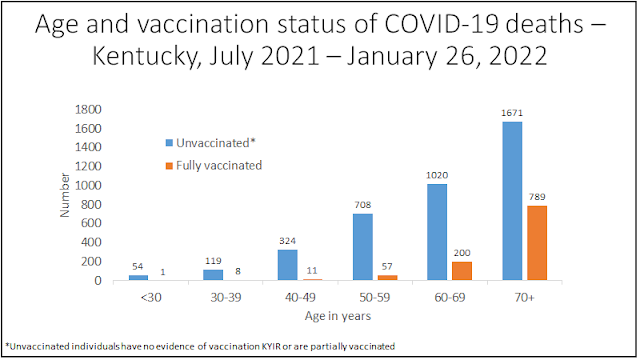Pandemic numbers seem to be nearing peak in Ky., but Beshear advises caution, warning that hospitals could still be overrun

State Department for Public Health graph; for a larger version, click on it.
—–
By Al Cross
Kentucky Health News
As the daily data signaled that the Omicron surge in coronavirus cases is nearing a peak in Kentucky, Gov. Andy Beshear said Kentuckians should still be careful because Covid-19 cases could still cause a crisis in hospitals.
“We hope and we do think that Omicron is cresting,” Beshear said at a regular briefing. But he also said, “Hospitalization is near a record high. We are close to the height of inpatient census that we saw it in the Delta-variant surge. Yes, Omicron is less deadly, but a heck of lot more people have it, meaning that there are a significant number of people that are getting really sick.”
The state reported 12,756 new cases Thursday, the eighth highest daily total of the pandemic, but that figure was lower than last Thursday’s, so the seven-day rolling average of daily new cases fell by more than 100, to 12,339.
But the average had set a record Wednesday, and The New York Times ranked Kentucky’s seven-day infection rate fourth among the states, based on Centers for Disease Control and Prevention data. The state, which calculates the rate differently, said it fell slightly, to 230.3 cases per 100,000 residents.
Counties with rates above 300 on the state’s daily report were: Hopkins, 406.6; McCracken, 393.1; Clay, 348.2; Harrison, 348; Muhlenberg, 346.2; Daviess, 337.6; Whitley, 324.6; Harlan, 321.3; Hardin, 320.8; Boyd, 319.5; Spencer, 313; Mercer, 312; Powell, 306.3; Ohio, 303.6; and Shelby, 300.1.
Kentucky hospitals reported 2,508 Covid-19 patients, just short of the record 2,541 recorded at the peak of the Delta surge. But that was only 15 more than the day before, a much smaller gain than the daily averages of the last few weeks, and there was one fewer Covid-19 patient in intensive care and 12 fewer on mechanical ventilation (473 and 259, respectively.)
Beshear said he didn’t have a hospitalizations prediction model because Omicron and Delta behave differently, but said he expects Covid-19 hospital cases to continue trailing coronavirus case reports by about two weeks.
The Omicron variant is less likely to cause severe illness, but is infecting many more people at a time when hospital admissions are typically high. Beshear said fewer than 100 intensive-care beds were available in the state Wednesday, and noted staff shortages. Some hospitals have suspended elective surgeries.
“We have a lot of staff that’s also out from our hospitals,” the governor said. “Folks, be careful. When this happens, we don’t have room or beds for people who get hurt in car accidents or have a stroke.”
The percentage of Kentuckians testing positive for the coronavirus in the last seven days is 31.6%. It has declined slightly for the last five days from the pandemic record of 32.65%.
The state reported 39 more Covid-19 deaths Thursday, equaling the highest daily total reported in the past month. That raised Kentucky’s pandemic death toll to 12,856.
“It is difficult, it is astounding,” Beshear said of the total. “It’s more than in any three wars put together, and that’s in 20 months, and that’s not including all the people we’ve lost to other things during this period of time. I just hope even as tired as we are, that we take a minute and realize that people are losing people very close to them, and that ought to give us the strength to … push through.”
 |
| State Department for Public Health graph; click on it to enlarge. |
Beshear displayed graphs showing that vaccination has prevented death in almost all fully vaccinated Kentuckians under 60 since Omicron became dominant. Because the variant is highly contagious, it has affected more people, increasing middle-aged Kentuckians’ share of total deaths. For example, he noted that before Omicron, people in their 30s and 40s accounted for only 2% of Covid-19 deaths, but since then they have been 10% of the total.
“These numbers tell the entire tale,” Beshear said, adding later, “Covid-19 right now is killing younger people at a higher rate that certainly we saw earlier in the pandemic.”
He also said, “If you get vaccinated, you need to still be careful, but you’re well protected” against “the deadliest thing in all our lifetimes.”